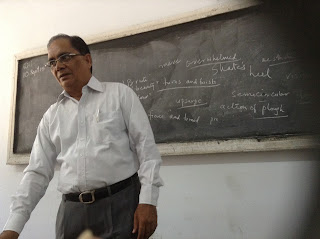Classroom: Welcome to the Student of Literature to learn the work of great authors and poets who contributed to enrich the treasure.
(The content belongs to original writers)
Poetry Paper II : ALL POEMS PRESCRIBED IN SYALLABUS
Explanation By Dr. S. Rajimwale
Lord Tennyson gives through the poem “Ulysses” the essential philosophy of ceaseless action which contrast with a move of his other famous poem “The Lotus Eater”. While in the latter poem the sailors express in one voice their reluctance to move and act, in this poem the single voice of the spirited old hero named Ulysses expresses his unquenchable thirst for more action and greater experience. His perception of life is that if a man has strong will no burden can stop him. .
The Windhover ~ A poem by
Gerard Manley Hopkins (1844–89)
To Christ our Lord
I CAUGHT this morning morning’s minion, king-
Of the rolling level underneath him steady air, and striding
High there, how he rung upon the rein of a wimpling wing
In his ecstasy! then
As a skate’s heel sweeps smooth on a bow-bend: the hurl and gliding
Rebuffed the big wind. My heart in hiding
Stirred for a bird,
Brute beauty and valour
Buckle! AND the fire that breaks from thee then
Times told lovelier, more dangerous, O my chevalier!
No wonder of it: shéer plód makes plough sillion
Shine, and blue-bleak embers, ah my dear,
Fall, gall themselves, and gash gold-vermillion.
Summary of the poem by eminent Professor S. K. Rajimwale
Although Hopkins belong age he asthetic
The poem entitledThe poet
He calls it the most favoured , , next three lines poet .
The next stanza goes beyond the mere physical aspect of the bird’s beauty. The poem uses three words, brute, beauty, and valour . poet , soil which plough subtitle
Felix Randal Explained By Professor S. .
Felix Randal by Gerard Manley Hopkins
FELIX RANDAL the farrier, O he is dead then? my
Who have watched his mould
Pining, pining, till time when reason rambled in it and some
Fatal four disorders, fleshed there, all contended?
Sickness broke him. Impatient he cursed at first, but mended
5
Being anointed and all; though a heavenlier heart began some
Months earlier, since I had our sweet reprieve and ransom
Tendered to him. Ah well, God rest him all road ever he offended!
This seeing the sick endears them to us, us too it endears.
My tongue had taught thee comfort, touch had quenched thy tears,
10
Thy tears that touched my heart, child, Felix, poor Felix Randal;
How far from then forethought of, all thy more boisterous years,
When thou at the random grim forge, powerful amidst peers,
Didst fettle for the great grey
Explanation
Felix Randal was a blacksmith like the Joe Gargery brother in law of Pip the main character in Great Expectations by Charles Dickens. Like Grgery
Felix lived in Liverpool and died of T.B. at
One of the main characteristics of Hopkins poem is Sprung Rhythm.
In Iambic pentameter unstressed syllable followed by stressed syllable indeterminate number syllable
In this poem ‘random grim forge, powerful amidst peers’ and ‘didst grey
“Inscape” and “instress characterstics inscape uniquness instress inscape inscape in . ae
The example of ‘inner unity of the object’ or ‘inner being of the things is ‘brute beauty’ in ‘windhover
Another beauty in the poem is probing descriptions. Poet
Anointed word is used to signify christian rituals of application of oil on forehead eucharist
Bright and battering sandals has horseshoes horse
The whole poem is beautiful recollection poet priest
Dr.
Dr. Hitendra
A portrait of the artist as young man
James Joyce
It was first novel semi autobiographical novel classical novel which state but intricacies
Stephan has started showing his special interest in the world of imagination. Later in this chapter we
The Chapter ends in a dramatic passion. During the study hour Stephan is unjustly thrashed by Perfect of studies. Stephan is overwhelmed by injustice and what has happened to him. . . to human being ,
In the second part of the narrative, we find Stephan Dedalus’s family living in poverty. The family has moved to Dublin. Stephan’s artistic evolution continues. He is increasingly fascinated with words.
He has become the best essay writer in school. He developed the habit of viewing the real world through words. himself tension
Dr.
Dr
Post-Colonial literature in English- Canadian
Atwood - If you can't say something nice; Don't say anything at all
Read the original text here
Dr. , . ,
Raja ram Mohan Roy was an Indian social and educational reformer. He was the founder of Brahmo Mughal Emperors
Read letter
Gandhi and Socialism
Read the article here
The Absurd Drama By Martin Esslin
"The Caretaker" By Harold Pinter and "Waiting for Godot" were taught in the classroom.






No comments:
Post a Comment
Note: Only a member of this blog may post a comment.